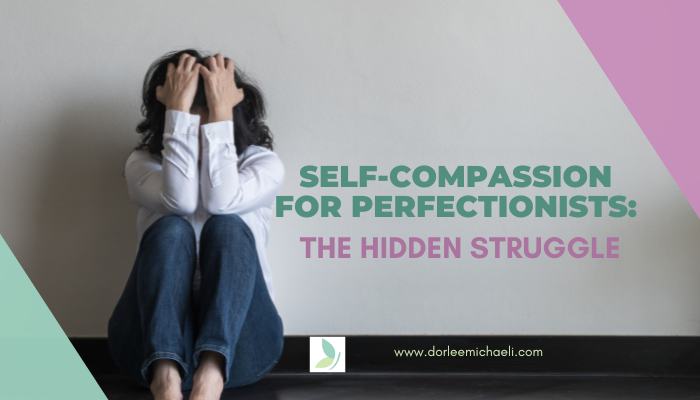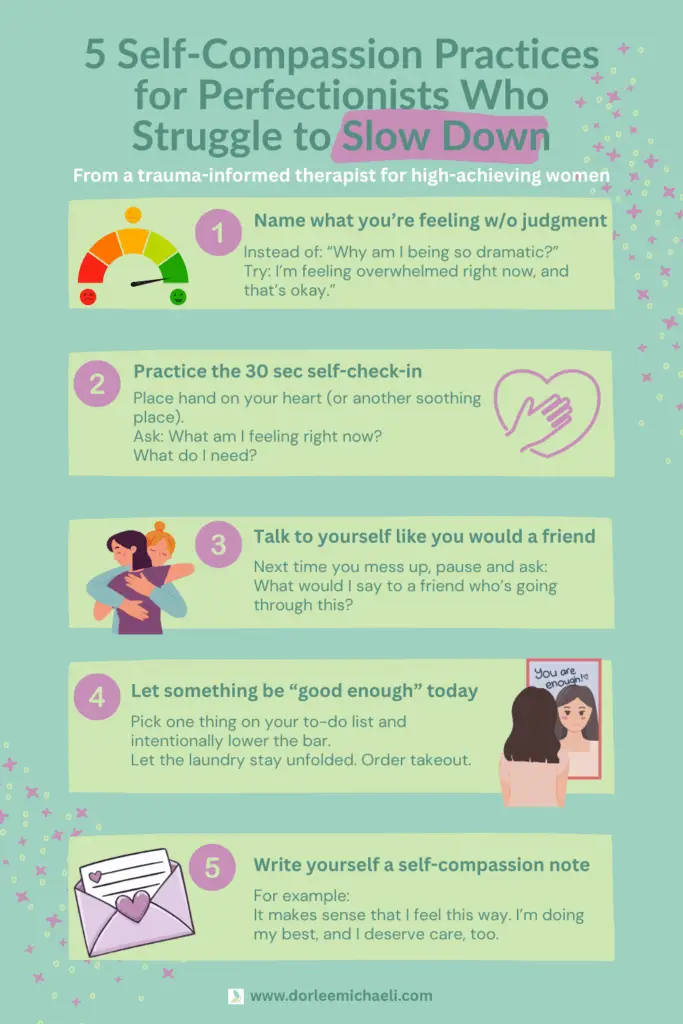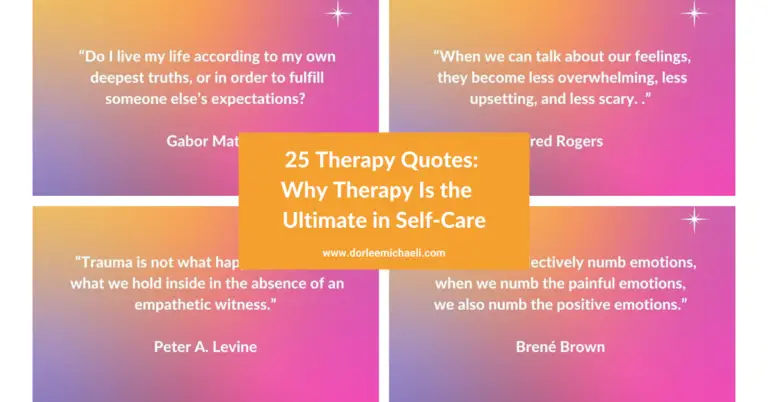
You’re doing so much.
Caring for everyone, your kids, your work, your partner, your aging parents. From the outside, it may even look like you’ve got it all together. Yet inside, there’s a sense of barely holding it together… and somehow still not doing enough.
If you relate to this, you’re not alone, and you’re exactly who this post is for. We’re talking about self-compassion for perfectionists: what it is, why it matters, and how it can help you
Many of the women I work with in therapy are high-achieving, deeply caring, and constantly navigating major life transitions. Divorce, career shifts, burnout, caregiving, grief. These aren’t small things. And yet they still feel like they’re supposed to “handle it all” with grace. When they can’t, the shame rushes in.
That’s where self-compassion for perfectionists becomes more than a concept; it becomes a lifeline.
It’s also where kindness for your inner critic becomes not just helpful, but essential.
Quick Answer: Why Self-Compassion Matters for Perfectionists
Self-compassion is treating yourself with the same kindness you’d offer a friend, especially when you make mistakes.
For perfectionists, it’s not about lowering standards; it’s about replacing fear-driven motivation with sustainable care.
Research shows it actually increases resilience and reduces burnout without making you less ambitious.
What Is Self-Compassion, Really?
Self-compassion is the practice of treating yourself with the same care and kindness you’d offer a dear friend.
It’s not about giving up or being indulgent. It’s about pausing, acknowledging your pain, and offering yourself support, instead of criticism, when things are hard.
Psychologist Kristin Neff, one of the leading researchers in this area, describes self-compassion as having three key elements:
-
Mindfulness – Noticing your suffering without exaggerating or ignoring it
-
Common humanity – Recognizing that you’re not alone in your struggles
-
Self-kindness – Offering warmth and understanding to yourself instead of judgment
Why Self-Compassion for Perfectionists Matters More Than Ever
If you were taught to succeed by pushing harder, suppress feelings, or always put others first, self-compassion can feel counterintuitive, even threatening.
But here’s the truth:
Perfectionism is exhausting. Self-compassion is sustainable.
When you’re in a constant state of self-criticism, your body stays in fight-or-flight mode, a common outcome of anxiety and perfectionism. Cortisol levels stay high, and over time, this leads to anxiety, burnout, and even chronic illness.
By contrast, self-compassion activates the soothing system of the brain, calming your nervous system, reducing stress, and increasing emotional resilience.
In other words:
Self-compassion doesn’t make you weaker. It makes you more resilient.
What Self-Compassion Is Not
Let’s pause here, because many of my clients worry that being self-compassionate will make them less productive, less ambitious, or even selfish.
But here’s the truth:
-
Self-compassion isn’t self-pity or wallowing.
Instead, it’s the choice to acknowledge your pain and respond with care. -
Moreover, it’s not a free pass to avoid growth. In fact, people who practice self-compassion tend to bounce back faster and take healthier risks because they’re not paralyzed by the fear of failure.
-
It’s not selfish. When you treat yourself with kindness, you become more resourced and present for the people around you, not less.
So if you’ve been afraid that letting yourself off the hook means giving up… remember:
Self-compassion is what helps you stay in the game, not walk away from it.
And for perfectionists especially, that shift can be life-changing.
Practicing self-compassion for perfectionists isn’t about being less driven; it’s about being driven by care, not fear.
Many high-achieving women also struggle with the Superwoman pattern, or the belief that you should be able to handle everything without help.
PERFECTIONISM VS. SELF-COMPASSION: A QUICK COMPARISON
| Perfectionism | Self-Compassion |
|---|---|
|
|
|
|
|
|
|
|
|
|
Why You Beat Yourself Up (And Why It’s Not Your Fault)
It might seem strange, but self-criticism often comes from a place of protection.
According to psychologist Paul Gilbert, our brains evolved with a built-in survival system that uses fear and shame to keep us in line, to avoid rejection, mistakes, or danger.
So when you hear that voice inside saying:
-
“You’re such a failure.”
-
“You should’ve done more.”
-
Or the familiar: “Why can’t you just get it together?”
…it’s not because you’re broken. It’s because some part of you believes that being harsh will keep you safe, from failure, from disappointment, from judgment.
Why that critical voice shows up
Self-criticism is often a misguided form of self-care.
It tries to motivate us or protect us, but at a steep cost.
This inner critic often shows up in specific patterns. You might recognize the Natural Genius trap, where struggle feels like failure, or the People-Pleaser pattern, where perfectionism becomes a way to earn approval.
The cost of shame
The truth is: Shame doesn’t lead to growth. Instead, it often leads to paralysis.
This is why so many high achievers benefit from compassionate self-talk rather than the pressure to “toughen up.”
you don’t have to fight the inner critic
When we understand that inner voice as a scared protector rather than a villain, we can start to soften.
We don’t have to fight it. We can meet it with curiosity.

5 Gentle Practices to Build Self-Compassion for Perfectionists
These small shifts are powerful ways to begin healing perfectionism through self-kindness, even when your inner critic says you don’t have time.
1. Name What You’re Feeling Without Judgment
Instead of saying, “Why am I being so dramatic?” try:
“I’m feeling overwhelmed right now, and that’s okay.”
Naming your emotion helps regulate it. In fact, you don’t need to fix it, just acknowledge it.
2. Practice the 30-Second Self-Check-In
Pause. Place your hand on your heart (or another soothing place).
Ask:
-
What am I feeling right now?
-
What do I need?
This moment of presence can break the autopilot of perfectionism and open the door to tenderness.
3. Talk to Yourself Like You Would a Friend
Next time you mess up, pause and ask:
“What would I say to a friend who’s going through this?”
Then say it to yourself. Out loud, if you can.
This rewires your brain’s self-talk pathways over time, and it’s a powerful example of gentle support for overachievers.
4. Let Something Be “Good Enough” Today
Pick one thing on your to-do list and intentionally lower the bar.
Let the laundry stay unfolded. Order takeout. Leave the email until tomorrow.
Compassion starts with permission. Especially when you’re used to pushing past your limits.
5. Write Yourself a Self-Compassion Note
This can be one sentence. Example:
“It makes sense that I feel this way. I’m doing my best, and I deserve care, too.”
Even a sticky note on your mirror can become a healing ritual.
Real Life: What Self-Compassion for perfectionists Looks Like in Action
Let’s say you’re in the middle of a tough transition. Maybe you just returned to work after a caregiving leave, and you’re struggling to catch up.
You’ve missed a few deadlines. The house is a mess, and the unanswered RSVP to your friend’s birthday dinner only adds pressure. At that moment, the familiar voice kicks in:
“You can’t even keep up with your life. What’s wrong with you?”
In the past, you might’ve pushed harder. Stayed up late. Cried in secret. And still felt like a failure.
But now, you pause.
You notice the tension in your chest. You take a breath. And you say gently:
“I’m overwhelmed. Of course I forgot something. I’ve been carrying so much.”
You give yourself a break. You skip the dinner, not out of avoidance, but as an act of care. You email your boss with a realistic timeline. You go to bed early.
And guess what happens?
You start the next day with more clarity. You’re less reactive. You actually get more done because your nervous system is no longer in overdrive.
This is self-compassion in motion. It’s not weakness.
It’s the reason you can keep showing up for your life without losing yourself.
What Your Inner Critic Might Really Be Saying
Let’s pause for a moment.
What if your inner critic isn’t trying to destroy you… but trying to keep you from getting hurt?
Try finishing these sentences:
-
“If I don’t push myself harder, then ___.”
-
“If I let myself rest, something bad might happen like ___.”
-
“That critical voice sounds like ___ (a parent, teacher, coach?)”
-
“My inner critic is trying to protect me from ___.”
This inner dialogue is often shaped by early experiences such as trauma, high expectations, and feeling unsafe to make mistakes.
Many of the women I work with grew up learning that love and worth had to be earned by achievement, helpfulness, or emotional control, patterns often reinforced by the inner critic.
So now, as adults, they carry that pressure into every corner of life. And when life gets overwhelming, which it inevitably does, the inner critic pipes up, trying to keep things “under control.”
But now you know:
You don’t have to earn your worth. You can speak to yourself with the kindness you’ve always deserved.
This may feel unfamiliar at first. Even uncomfortable. But that’s okay.
Healing begins by noticing old patterns and choosing something new, one moment at a time.
If it feels hard, you’re not doing it wrong. You’re doing it bravely.
But What If This Feels Too Hard?
That’s okay.
If you’ve spent years powering through, slowing down and softening can feel vulnerable, even unsafe.
Self-compassion for perfectionists is a skill you build, not something you master overnight.
If you’re in the thick of a life transition, feeling like an imposter or “back to square one,”know that you are not broken. You are human. This is where healing begins.
You don’t have to figure this out alone.
FAQ: Self-Compassion for Perfectionists
1. What’s the difference between self-compassion and self-pity?
Self-compassion acknowledges pain with kindness and perspective, while self-pity exaggerates suffering and leaves you feeling isolated.
2. Will self-compassion make me lazy or less ambitious?
No. Research shows self-compassion actually increases motivation, resilience, and the ability to take healthy risks, because you’re not paralyzed by fear of failure.
3. How does self-compassion help with perfectionism and anxiety?
Self-compassion calms the nervous system, reduces cortisol, and makes it easier to recover from mistakes without spiraling into shame. This lowers anxiety and helps prevent burnout.
4. Can therapy help me become more self-compassionate?
Yes. Therapy offers a safe space to understand where your inner critic comes from, practice kinder self-talk, and build lasting resilience, especially if perfectionism has been your default for years.
A Gentle Reminder
You are not lazy. Not weak. Not failing.
Rather, behind the exhaustion is someone carrying more than most and still showing up.
This is where compassion belongs, not criticism.
Self-compassion doesn’t mean stopping; it means supporting yourself as you keep going.
And sometimes, the most powerful thing you can do is let go of self-judgment and soften into care.
If you’re also wondering why smart women still feel like frauds, you’re not alone.
Therapy Can Help You Come Home to Yourself
Therapy for perfectionists offers a space where your needs get to matter.
You don’t have to hold it all together there.
Your feelings aren’t “too much;” they’re welcome.
Where you don’t have to prove your worth, only show up as you are.
If you’re navigating a season of burnout, transition, or just trying to be everything to everyone, therapy can help you soften the pressure and come home to yourself.
I specialize in helping quiet, high-achieving women in tech, finance, and healthcare who are tired of feeling like they’re never enough. Together, we’ll practice self-compassion so you can thrive, without burning out.
I offer therapy for perfectionists and high-achievers in New York, New Jersey, and Chicago (Illinois). Sessions are held online, so you can get support from the comfort of your own space.
👉 Schedule a free 20-minute consultation here or explore how I work on my website.
Neff, K. (2011). Self-compassion: Stop beating yourself up and leave insecurity behind. William Morrow
Published: August 24, 2024





Pingback: 25 Therapy Quotes: Self-Care Through Therapy
Pingback: How to Stop a Panic Attack: Effective Methods
Pingback: Why Smart Women Still Feel Like Frauds
This is such a powerful read. The part that really stood out to me was how you described self-criticism as a kind of “protector.” That hit home. I love how you broke down the difference between perfectionism and self-compassion in such a clear, doable way. It feels like such a relief to be reminded that compassion isn’t weakness. It’s what actually helps us keep going.
I’m so glad that part resonated, Cheryl. It can be eye-opening to see self-criticism as a protector, even though it often overdoes its job. And yes, you captured it beautifully. Compassion isn’t weakness; it’s what lets us keep moving forward.